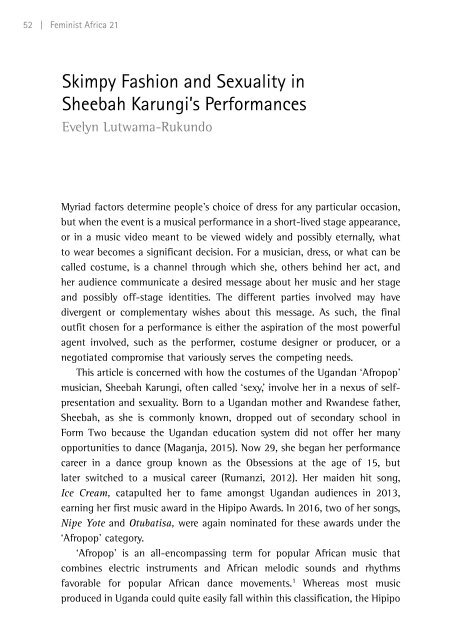The politics of fashion and beauty in Africa
fa21_proof_3
fa21_proof_3
You also want an ePaper? Increase the reach of your titles
YUMPU automatically turns print PDFs into web optimized ePapers that Google loves.
52 | Fem<strong>in</strong>ist <strong>Africa</strong> 21<br />
Skimpy Fashion <strong>and</strong> Sexuality <strong>in</strong><br />
Sheebah Karungi’s Performances<br />
Evelyn Lutwama-Rukundo<br />
Myriad factors determ<strong>in</strong>e people’s choice <strong>of</strong> dress for any particular occasion,<br />
but when the event is a musical performance <strong>in</strong> a short-lived stage appearance,<br />
or <strong>in</strong> a music video meant to be viewed widely <strong>and</strong> possibly eternally, what<br />
to wear becomes a significant decision. For a musician, dress, or what can be<br />
called costume, is a channel through which she, others beh<strong>in</strong>d her act, <strong>and</strong><br />
her audience communicate a desired message about her music <strong>and</strong> her stage<br />
<strong>and</strong> possibly <strong>of</strong>f‐stage identities. <strong>The</strong> different parties <strong>in</strong>volved may have<br />
divergent or complementary wishes about this message. As such, the f<strong>in</strong>al<br />
outfit chosen for a performance is either the aspiration <strong>of</strong> the most powerful<br />
agent <strong>in</strong>volved, such as the performer, costume designer or producer, or a<br />
negotiated compromise that variously serves the compet<strong>in</strong>g needs.<br />
This article is concerned with how the costumes <strong>of</strong> the Ug<strong>and</strong>an ‘Afropop’<br />
musician, Sheebah Karungi, <strong>of</strong>ten called ‘sexy,’ <strong>in</strong>volve her <strong>in</strong> a nexus <strong>of</strong> selfpresentation<br />
<strong>and</strong> sexuality. Born to a Ug<strong>and</strong>an mother <strong>and</strong> Rw<strong>and</strong>ese father,<br />
Sheebah, as she is commonly known, dropped out <strong>of</strong> secondary school <strong>in</strong><br />
Form Two because the Ug<strong>and</strong>an education system did not <strong>of</strong>fer her many<br />
opportunities to dance (Maganja, 2015). Now 29, she began her performance<br />
career <strong>in</strong> a dance group known as the Obsessions at the age <strong>of</strong> 15, but<br />
later switched to a musical career (Rumanzi, 2012). Her maiden hit song,<br />
Ice Cream, catapulted her to fame amongst Ug<strong>and</strong>an audiences <strong>in</strong> 2013,<br />
earn<strong>in</strong>g her first music award <strong>in</strong> the Hipipo Awards. In 2016, two <strong>of</strong> her songs,<br />
Nipe Yote <strong>and</strong> Otubatisa, were aga<strong>in</strong> nom<strong>in</strong>ated for these awards under the<br />
‘Afropop’ category.<br />
‘Afropop’ is an all-encompass<strong>in</strong>g term for popular <strong>Africa</strong>n music that<br />
comb<strong>in</strong>es electric <strong>in</strong>struments <strong>and</strong> <strong>Africa</strong>n melodic sounds <strong>and</strong> rhythms<br />
favorable for popular <strong>Africa</strong>n dance movements. 1 Whereas most music<br />
produced <strong>in</strong> Ug<strong>and</strong>a could quite easily fall with<strong>in</strong> this classification, the Hipipo



